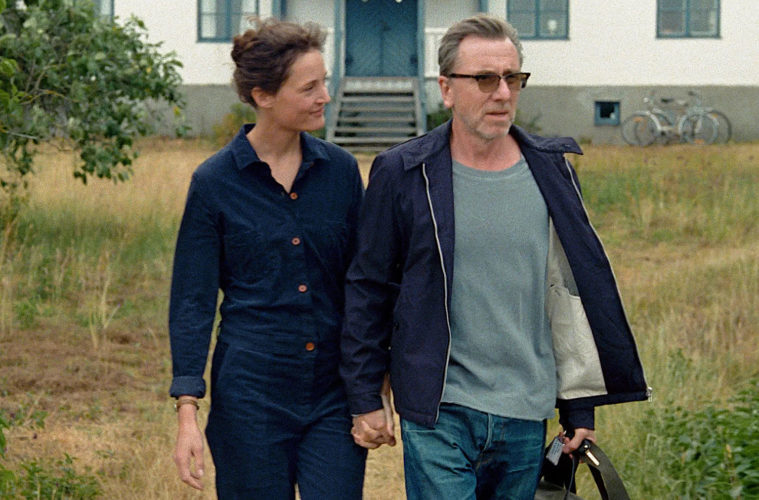Bergman Island refers to Fårö, the 43-square-mile body of land off the Swedish coast where legendary filmmaker Ingmar Bergman lived and worked. In the wake of Bergman’s death, Fårö has become both a tourist attraction and a popular resort for artists seeking fresh inspiration. In Mia Hansen-Løve’s film, which played in competition at Cannes earlier this year, it’s a place that verges on the magical, a locus of romantic and spiritual renewal.
Chris (Vicky Krieps) and Tony (Tim Roth) are a married couple who retreat to Bergman Island for the summer. They are drifting apart. He’s an accomplished filmmaker who only pays the slightest attention to his wife’s artistic endeavors with no interest whatsoever in collaborating with her. He is also experiencing a sort of sexual crisis, disturbing evidence of which Chris discovers in his journals. While Tony goes on a guided Bergman safari, Chris wanders off and meets Hampus (Hampus Nordenson), a young film student whose conversation seems to revive her creatively. She returns with the idea for a story, which she begins to tell to her husband.
At this point, the film makes a bold narrative digression as we see Chris’s story come to life. Amy (Mia Wasikowska) is visiting Fårö for a wedding and hoping to rekindle a romance with Joseph (Anders Danielsen Lie), an old boyfriend. They, too, seem to fall under the spell of the island and confess their deepest longings to each other. Is Chris simply retelling a chapter of her own life, the way Bergman fed imaginatively on his childhood for his fictions? Or are Amy and Joseph actual people living on the island? Hansen-Løve’s directorial sleight-of-hand keeps the answers to these questions deliciously ambiguous. There is a relaxed, sensual clarity to the flow of images, and the film makes excellent use of several beautiful string pieces by Robin Williamson, one of the founding members of The Incredible String Band. The spiritual intensity that fueled Bergman’s own art is replaced here with a cool, searching curiosity.
Of the quartet of actors inhabiting these mirrored roles, Kripes brings a fine-boned fragility to a part originally intended for Greta Gerwig. But the real star is, of course, the eponymous island, with its blasted heaths and blinding beaches. Bergman believed in ghosts (or so one character tells us) and the spirit of Bergman seems to haunt the film itself; the theater that Chris and Tony visit reserves an empty seat in the front row for the deceased director.
His death also left a hole that has yet to be filled. When asked about the questions that burned in Bergman’s soul (“Oh, God! Why did you abandon me?”) the film student shrugs and says, “Nobody in Sweden cares anymore.” In this telling exchange, Hansen-Løve finds fault with postmodern society’s lack of faith. Bergman Island acknowledges the spiritual maelstrom that Bergman weathered — and worked out so powerfully in his cinema — as evidence of a life well examined and truly lived. The island bears witness to this testament.
Advertising disclosure: We may receive compensation for some of the links in our stories. Thank you for supporting Irvine Weekly and our advertisers.

